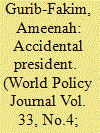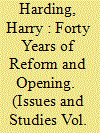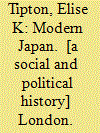| Srl | Item |
| 1 |
ID:
149547


|
|
|
|
|
| Summary/Abstract |
World Policy Journal speaks with Dr. Ameenah Gurib-Fakim, a biochemist who became the first female president of Mauritius. She discusses the importance of integrating science into politics, what prevents women from rising into positions of power, and how her country pulled off its “economic miracle.”
|
|
|
|
|
|
|
|
|
|
|
|
|
|
|
|
| 2 |
ID:
171974


|
|
|
| 3 |
ID:
046716


|
|
|
|
|
| Publication |
London, Routledge, 2002.
|
| Description |
xiii, 258p.pbk
|
| Series |
Nissan Institute/Routledge Japanese Studies Series
|
| Standard Number |
0415185386
|
|
|
|
|
|
|
|
|
|
|
|
Copies: C:1/I:0,R:0,Q:0
Circulation
| Accession# | Call# | Current Location | Status | Policy | Location |
| 045706 | 952.049/TIP 045706 | Main | On Shelf | General | |
|
|
|
|
| 4 |
ID:
137364


|
|
|
|
|
| Summary/Abstract |
Theories that explain post-Mao China's economic success tend to attribute it to one or several ‘successful’ policies or institutions of the Chinese government, or to account for the success from economic perspectives. This article argues that the success of the Chinese economy relies not just on the Chinese state's economic policy but also on its social policies. Moreover, China's economic success does not merely lie in the effectiveness of any single economic or social policy or institution, but also in the state's capacity to make a policy shift when it faces the negative unintended consequences of its earlier policies. The Chinese state is compelled to make policy shifts quickly because performance constitutes the primary base of its legitimacy, and the Chinese state is able to make policy shifts because it enjoys a high level of autonomy inherited from China's past. China's economic development follows no fixed policies and relies on no stable institutions, and there is no ‘China model’ or ‘Beijing consensus’ that can be constructed to explain its success.
|
|
|
|
|
|
|
|
|
|
|
|
|
|
|
|